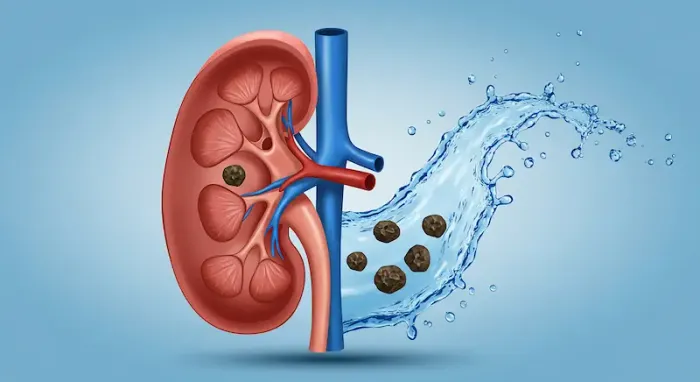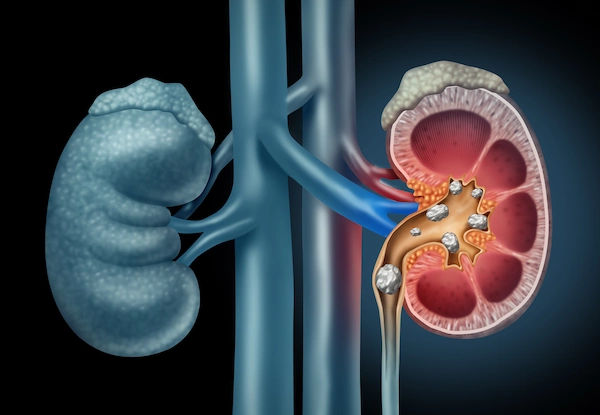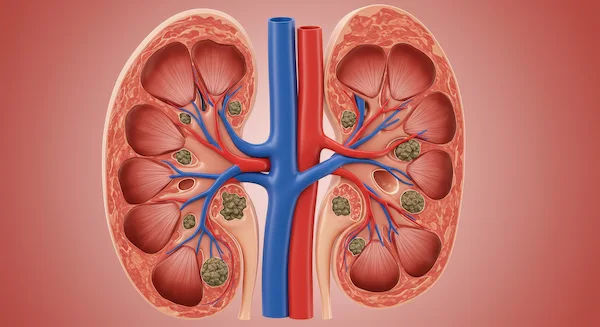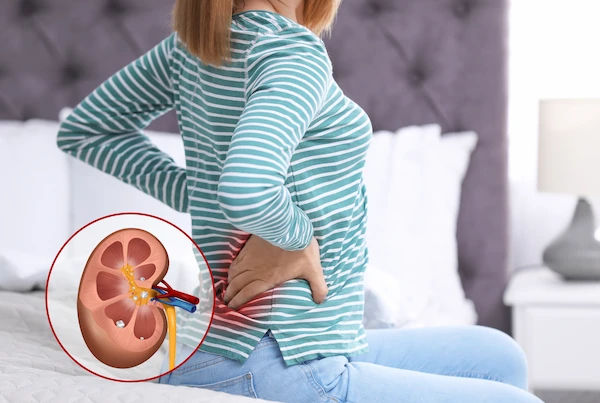Your Easy Guide to Preventing Painful Kidney Stones
Discover simple, science-backed tips to prevent kidney stones. Learn about hydration, diet, lifestyle changes, and risk factors to protect your kidneys.


Introduction
Dealing with a kidney stone is an experience many describe as among the worst pains imaginable—a sharp, cramping agony that radiates through the back and side. If you've ever had one, you'll do anything to avoid a repeat. And if you haven't, you'll want to keep it that way. The good news? Preventing kidney stones is often within your control. It’s not about complex medical regimens; it’s about smart, consistent daily habits. This easy guide breaks down the science of stone prevention into simple, actionable steps you can start today. We’ll explore everything from the power of water to the truth about dietary oxalates, giving you the knowledge to protect your kidneys and live pain-free.
What Are Kidney Stones, Really?
Think of kidney stones as hardened, crystallised deposits that form inside your kidneys. They start small—like a grain of sand—but can grow to the size of a pebble or even a golf ball. They form when your urine contains more crystal-forming substances (like calcium, oxalate, and uric acid) than the fluid in your urine can dilute. At the same time, your urine may lack substances that prevent crystals from sticking together, creating an ideal environment for stones to form. When these stones decide to move from your kidney through your urinary tract, that’s when the infamous pain begins.
The Four Main Types of Kidney Stones
Knowing the type of stone you had can help tailor your prevention strategy:
Calcium Oxalate: The most common type, forming when calcium combines with oxalate.
Uric Acid: More common in people who don't drink enough fluids, eat a high-protein diet, or have gout.
Struvite: Often form in response to a urinary tract infection.
Cystine: Rare and caused by a hereditary disorder that makes kidneys excrete too much of a specific amino acid.
The Golden Rule of Prevention: Stay Hydrated
This is the single most important piece of advice for preventing kidney stones. Water dilutes the substances in urine that lead to stones. Think of it as turning a thick, sugary syrup (where crystals form easily) into a weak lemonade (where they don't).
How Much Water Should You Really Drink?
The old "eight glasses a day" is a good start, but a better goal is to produce about 2.5 litres of urine a day. For most people, this means drinking roughly 8-10 large glasses (about 2-2.5 litres) of fluid daily. A great visual cue: your urine should be light yellow or clear. If it’s dark, drink up!
Best and Worst Drinks for Kidney Stone Prevention
Best: Water is king. Lemon water and lime water are fantastic runners-up because they’re rich in citrate, a natural inhibitor of kidney stones.
Proceed with Caution: Sugar-sweetened fizzy drinks and drinks high in fructose corn syrup are linked to a higher risk of stones.
Worst: Grapefruit juice has been oddly linked to an increased risk of stones in some studies.
Rethink Your Plate: The Dietary Defence Plan
What you eat plays a starring role in stone formation. You don’t need to eliminate entire food groups—just become more mindful.
The Oxalate Controversy: To Avoid or Not to Avoid?
If you’ve had a calcium oxalate stone, you might have been told to avoid high-oxalate foods. But it’s more nuanced than that. The key is to consume oxalate-rich foods alongside calcium-rich foods. The calcium binds to oxalate in your intestines before it reaches your kidneys, preventing it from forming stones.
Consult a Nephrologist for the best advice
High-Oxalate Foods to Be Aware Of
Be mindful of portions with: spinach, rhubarb, almonds, cashews, beets, soya products, and sweet potatoes. You don't need to eliminate them—just pair them with calcium.
The Calcium Connection: Why You Shouldn't Skip Dairy
This is a common misconception. A diet low in calcium can actually increase your risk of kidney stones. As explained above, dietary calcium helps block oxalate absorption. Aim for calcium from food sources like yoghurt, milk, and cheese rather than supplements, unless your doctor advises otherwise.
Slash Sodium to Save Your Kidneys
A high-sodium diet increases the amount of calcium your kidneys have to filter, significantly raising your stone risk. Processed foods, canned soups, packaged snacks, and restaurant meals are often loaded with sodium. Aim for less than 2,300 mg per day. Reading nutrition labels is your first line of defence.
Moderating Animal Protein (The Meat-Lover's Guide)
Diets high in animal protein (red meat, poultry, eggs, seafood) can increase uric acid levels and lower citrate levels—both risk factors for stones. You don’t need to go full vegetarian, but try having a few meat-free days each week or reducing your portion sizes. Consider plant-based proteins like lentils and beans as alternatives.
Beyond Diet: Powerful Lifestyle Changes
The Role of Exercise and Healthy Weight
Being overweight is a significant risk factor for stones. Regular physical activity helps maintain a healthy weight and can improve overall metabolic health. However, if you engage in intense exercise that causes heavy sweating, remember to rehydrate even more, as dehydration from sweat can concentrate urine.
The Hidden Dangers of Certain Supplements
Megadoses of Vitamin C supplements can be converted into oxalate in your body. Similarly, excessive calcium supplements (without food) can increase stone risk. Always talk to your doctor before starting any new supplement regimen, especially if you have a history of stones.
When Prevention Isn't Enough: Knowing Your Risk Factors
Some factors are beyond your control. These include a family or personal history of stones, certain medical conditions (like renal tubular acidosis or inflammatory bowel disease), and some medications. If you fall into a high-risk category, it’s crucial to work with a doctor. They can perform a 24-hour urine collection test to analyse your unique risk profile and may prescribe preventive medications, like potassium citrate, if needed. If you have recurring stones or severe pain, consult a urologist online with Apollo24|7 for a personalised management plan.
Conclusion
Preventing kidney stones doesn't require a complete life overhaul. It’s about building sustainable, healthy habits centred on smart hydration and mindful eating. By drinking plenty of fluids, balancing your plate, and understanding your personal risk factors, you can dramatically reduce your chances of ever experiencing this painful condition. Remember, consistency is key. Start by implementing one or two changes from this guide—perhaps carrying a water bottle everywhere or adding a lemon to your morning glass of water. Your kidneys will thank you for years to come. If you have specific concerns or a history of stones, don't hesitate to seek professional guidance to create a prevention plan that’s perfect for you.Consult a Nephrologist for the best advice
Consult a Nephrologist for the best advice

Dr. Krishna V Patil
Nephrologist
16 Years • MBBS, MD(Med), DM(Nephrology), FICN(Canada), Fellow of American Society of Nephrology
Hyderabad
Apollo Hospitals Financial District, Hyderabad

Dr. Manju Kamal
Nephrologist
12 Years • MBBS,MD(General Medicine), DNB,DM(Nephrology)
Angamaly
Apollo Hospitals Karukutty, Angamaly

Dr. S. Anil Kumar Patro
Nephrologist
14 Years • MD, DNB
Chinagadila
Apollo Hospitals Health City Unit, Chinagadila
(25+ Patients)

Dr. Akash Deep Suri
Nephrologist
17 Years • MD,DM,DNB
Bhopal
Apollo Sage Hospitals, Bhopal
(25+ Patients)

Dr. Brijesh Singh
Nephrologist
2 Years • MBBS,MD,DM
Guwahati
Apollo Excelcare Hospital, Guwahati
Consult a Nephrologist for the best advice

Dr. Krishna V Patil
Nephrologist
16 Years • MBBS, MD(Med), DM(Nephrology), FICN(Canada), Fellow of American Society of Nephrology
Hyderabad
Apollo Hospitals Financial District, Hyderabad

Dr. Manju Kamal
Nephrologist
12 Years • MBBS,MD(General Medicine), DNB,DM(Nephrology)
Angamaly
Apollo Hospitals Karukutty, Angamaly

Dr. S. Anil Kumar Patro
Nephrologist
14 Years • MD, DNB
Chinagadila
Apollo Hospitals Health City Unit, Chinagadila
(25+ Patients)

Dr. Akash Deep Suri
Nephrologist
17 Years • MD,DM,DNB
Bhopal
Apollo Sage Hospitals, Bhopal
(25+ Patients)

Dr. Brijesh Singh
Nephrologist
2 Years • MBBS,MD,DM
Guwahati
Apollo Excelcare Hospital, Guwahati
More articles from Kidney stones
Frequently Asked Questions
Does lemon water really help prevent kidney stones?
Yes! Lemonade and lime juice are rich in citrate, a compound that helps prevent calcium crystals from forming into stones. It’s one of the easiest and most effective natural remedies.
What are the first signs of a kidney stone?
The first sign is often severe, sharp pain in your back or side below the ribs that comes in waves. Other symptoms can include pain radiating to the lower abdomen, painful urination, pink/red/brown urine, nausea, and a persistent need to urinate.
Can I eat spinach if I'm prone to kidney stones?
Yes, but in moderation and with strategy. Pair your spinach salad with a calcium-rich food like cheese or yoghurt. The calcium will bind to the oxalates in the spinach in your gut, preventing them from being absorbed and reaching your kidneys.
How long does it take to pass a kidney stone?
This can vary widely from days to weeks, depending on the stone's size and location. Smaller stones (<4mm) often pass on their own with plenty of water. Larger stones may require medical intervention.
Are there any tests to see my kidney stone risk?
Yes. If you are at high risk or have had multiple stones, a doctor might order a 24-hour urine collection test. This test analyses the volume, chemistry, and stone-forming compounds in your urine. Apollo24|7 offers convenient home collection for this and other diagnostic tests, making the process easier.


.webp)

